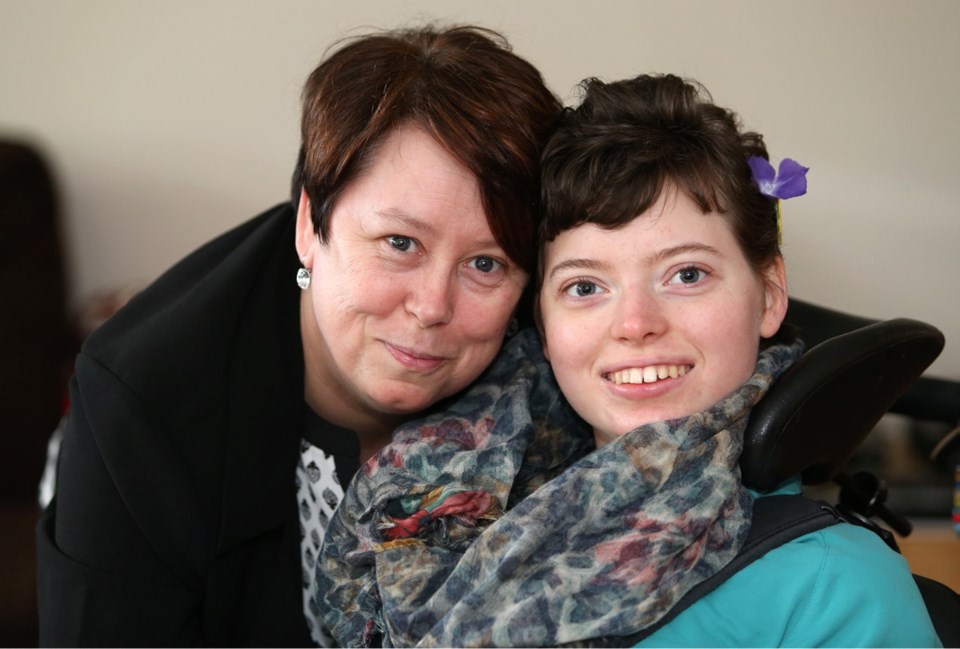Social Development Minister Michelle Stilwell has ordered a government agency to reinstate around-the-clock care for a 19-year-old Victoria woman with a severe developmental disability.
The move comes after Community Living B.C. announced in April that it was cutting Katrina Lavery’s at-home care from 24 hours a day to 16 — the same day her mother, Margaret Lavery, rejected a group home placement as potentially unsafe.
Margaret told the Times Colonist at the time that she viewed the reduction in care as “punitive,” an allegation CLBC denied.
But Stilwell subsequently ordered a review by service quality advocate Leanne Dospital that found problems with CLBC’s handling of the file, including its decision to reduce Katrina’s care.
Dospital’s report stated it’s unclear from the evidence “how 16 hours versus 24 hours per day of care is calculated or the need determined.”
She said one CLBC official told her that he “did the math” and determined Katrina had been receiving 16 hours in care from the B.C. Children’s Ministry before transitioning to adult services.
But the same official was unable to “provide any documentation to support this,’’ the report said.
Dospital also found a note indicating that chief executive officer Seonag Macrae directed CLBC staff to provide “16 hours/day of care in the home if mom refuses” the group home placement.
“Margaret claims that the reduction from 24 to 16 hours was punitive,” Dospital writes in her report.
“Considering the discretionary nature of this decision, inconsistent and informal communication about how the decision was made, and the timing of the decision, after Margaret turned down [the group home], it would not be unreasonable for Margaret to perceive that CLBC was not acting in good faith.”
Stilwell has directed CLBC to implement all of Dospital’s recommendations, including reinstating 24-hour care in Katrina’s home “until she moves into a new home or until Dec. 31, 2016, whichever comes first.”
“I regret that your daughter’s transition to CLBC services has been extremely challenging and unsettling for both you and [her],” Stilwell said in a letter to Margaret this month.
CLBC, which oversees services for adults with developmental disabilities, said in a statement that it “fully supports” Dospital’s review.
“CLBC also regrets that Ms. Lavery has felt its actions have been punitive,” the statement said.
“While this has never been the intention, we are committed to acting on the report’s recommendations to improve.”
CLBC said it never enforced the reduction in care hours and that Katrina has been receiving 24-hour support.
Margaret said she is generally happy with Dospital’s findings, but questions whether CLBC will follow through on the recommendations. “It doesn’t speak to what happens next,” she said.
CLBC has a plan to move Katrina into a home by the end of August, but Margaret notes that the home is slated for demolition within the next two years. “So it’s not permanent,” she said.
Dospital concluded that CLBC’s relationship with Margaret was severely damaged by an aborted plan to convert her house to a group home for Katrina and others in 2015.
Dospital said the plan, which fell apart two months before Katrina turned 19, was marked by “significant confusion” and a “lack of formal communication.” The report said CLBC failed to consider that Margaret was financially and emotionally vulnerable and at risk of “burn out.”
Dospital acknowledged that Margaret is vociferous, passionate and a staunch advocate for her daughter.
“In the social service realm she would be considered a challenging client,” the report said. “But the determined nature of this single mom belies her vulnerability. ... Based on the review of documentation and interviews, Margaret is clearly struggling and needs help to decide what exactly she wants for Katrina and in turn, herself.”
Dospital noted that CLBC is trying to work with Margaret to find feasible options for Katrina’s future, but “there is too much damage to the trust that it may not be possible to continue with current staff.”
The report highlighted one email in which a CLBC staff member, discussing Katrina’s care, tells another: “…ah yes, the usual Friday drama has begun.”
Dospital said that “dismissive attitude” will continue to undermine the relationship unless efforts can be made to re-engage Margaret and “acknowledge the hurt she has experienced.”
The report recommended mediation between Margaret and CLBC as “both parties need a fresh start” and called on CLBC to explain to Margaret why her house was not viable as a group home.
“And if, in the exploration of these answers, it becomes a viable option, develop a project plan that clearly outlines scope, responsibilities, and timelines.”
Stilwell said in an interview that it’s a stressful time for families when their child transitions to adult services.
“The role of CLBC is to ensure that we’re supporting in the best way possible,’’ she said. “I think the advocate definitely found some areas of improvement for CLBC, particularly in the communication area between staff and family members.”
Stilwell said she expects CLBC officials to study Dospital’s review and implement her recommendations “as quickly as possible.”



